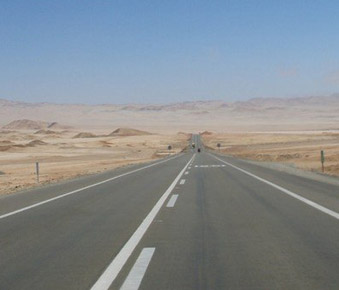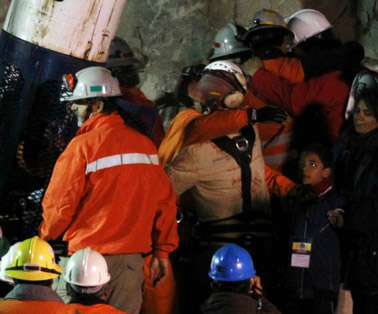Coming of age in Copiapó .. Chile mine rescue just another sign of the times
Oct 13th, 2010 | By Citizen X | Category: In Brief [UPDATED OCTOBER 14]. According to the customary North American prejudice, South America, while sometimes entertaining (like Ricky Ricardo on the old “I Love Lucy” TV show, eg), is for most purposes not quite up to handling the real world.
[UPDATED OCTOBER 14]. According to the customary North American prejudice, South America, while sometimes entertaining (like Ricky Ricardo on the old “I Love Lucy” TV show, eg), is for most purposes not quite up to handling the real world.
At the time of writing here (October 13, 2010, 7 PM ET / 4 PM PT), only 26 of the 33 miners trapped underground since August 5 at the San José copper-gold mine near Copiapó, Chile have been rescued. And from some points of view, as a sister-in-law of one of the miners has explained: “This won’t be a success unless they all get out.”
Moreover, there are apparently still various problems that could arise, in what has so far proved a remarkably smooth and well-managed rescue operation – run by Codelco, Chile’s “state-owned copper producer,” under the guidance of Mining Minister Laurence Golborne. (Even though the mine in question is owned and operated by a private sector firm known as “Empresa Minera San Esteban, which has a poor safety record and has suffered a series of mishaps, with several workers being killed in recent years.”)
Yet already it seems clear enough that Chile has shown how one of the many fresh ingredients in the new and more diversely globalized world order now taking shape, as we (hopefully) stagger out of the current Great Recession – or whatever it might more aptly be called – is a new kind of elan and practical public skill in the heretofore wild mystery regions of South America. [UPDATE OCTOBER 14, 12:10 AM ET: And now all 33 miners have in fact been safely rescued – and there is no need for any qualifications on congratulations to all involved.]
Of course, you can always say that Chile itself is not exactly typical of its wider geographic region. It is a long, thin strip of land on the Pacific coast, with about half the population of Canada today. And it is also “one of South America’s most stable and prosperous nations.” It leads other “Latin American nations in human development, competitiveness, quality of life, political stability, income per capita, globalization, economic freedom, low perception of corruption and comparatively low poverty rates.”
In the true north strong and free we have similarly had a “Canada – Chile Free Trade Agreement” in effect since July 5, 1997. And: “A pair of executives with a Calgary-based drilling company helping the effort to rescue trapped miners are in Chile today to witness the historic event … Precision Drilling … mobilized its only rig in the South American nation and began drilling on Sept. 19 as part of a ‘Plan C’ to reach the trapped miners … As of Oct. 12 it had drilled 514 metres of a planned 597 metres before drilling was suspended. In addition to Precision, Calgary company ATCO was involved in the rescue.”

On the road to Copiapó, in Chile’s “northern desert,” which “contains great mineral wealth, principally copper.”
(Then too, not to be altogether parochial: “BHP Billiton Ltd. [‘the world’s largest mining company … also the largest company in Australia by market capitalisation’] and other mining companies [and “the Austrian company that made the” rescue “capsule’s winch and pulley system”] as well as the National Aeronautics and Space Administration [in the USA], assisted in the rescue” – which by far and away already “surpasses a 25-day rescue of three coal miners from a flooded mine in Guizhou, China, in 2009.”)
Still, say whatever else you like. The very bottom line here, as President Pinera told reporters in some televised remarks, is undeniable: “We have given an example to the world of commitment, of effort, of hope. I’m convinced that Chile’s greatest treasure isn’t copper, it’s the miners.”
Or, it really isn’t just North Americans who can manage big and difficult tasks skilfully. In fact, it’s hard to think of any comparable situation in the more recent past in which North Americans (or should we more exactly say Anglo-Americans, including English-speaking Canadians?) have shown anything like this kind of public-spirited commitment, effort, and hope.

Chilean miner Florencio Avalos reaches the surface as the first of the 33 trapped miners to be hoisted to safety.
In North America (especially north of the Rio Grande) we sometimes seem to have lost all interest in human experiences that do not directly involve allegedly hard-headed calculations of dollars and cents. That’s what we think economic realism means. Along with its impressive mine-accident rescue skills, Chile right now may also be showing us a more effective route to real economic recovery – and the parallel commitment, effort, and hope, by large numbers among us, that this is finally going to take too. (Remember how it finally took the Second World War to pull us out of the Great Depression?)

